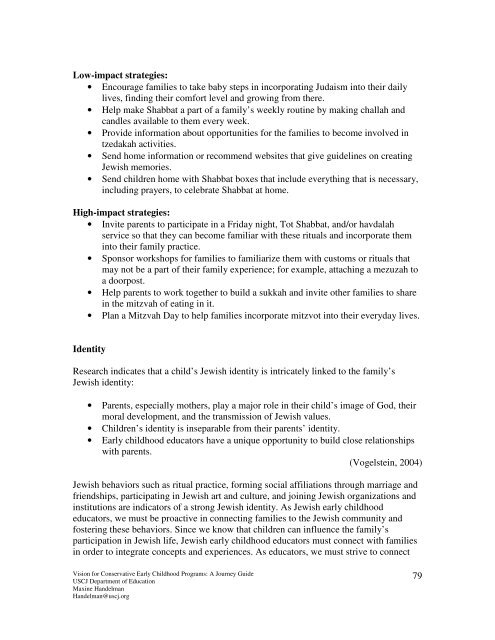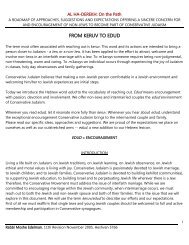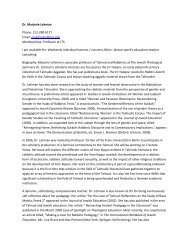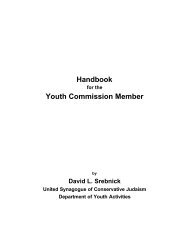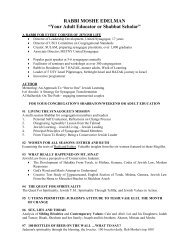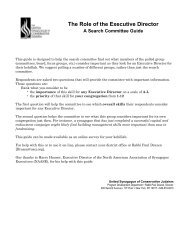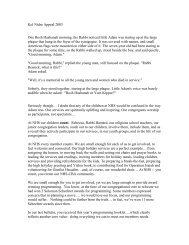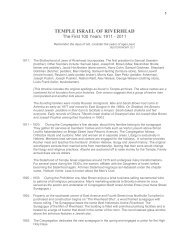Vision for Conservative Early Childhood Programs: A Journey Guide
Vision for Conservative Early Childhood Programs: A Journey Guide
Vision for Conservative Early Childhood Programs: A Journey Guide
Create successful ePaper yourself
Turn your PDF publications into a flip-book with our unique Google optimized e-Paper software.
Low-impact strategies:<br />
• Encourage families to take baby steps in incorporating Judaism into their daily<br />
lives, finding their com<strong>for</strong>t level and growing from there.<br />
• Help make Shabbat a part of a family’s weekly routine by making challah and<br />
candles available to them every week.<br />
• Provide in<strong>for</strong>mation about opportunities <strong>for</strong> the families to become involved in<br />
tzedakah activities.<br />
• Send home in<strong>for</strong>mation or recommend websites that give guidelines on creating<br />
Jewish memories.<br />
• Send children home with Shabbat boxes that include everything that is necessary,<br />
including prayers, to celebrate Shabbat at home.<br />
High-impact strategies:<br />
• Invite parents to participate in a Friday night, Tot Shabbat, and/or havdalah<br />
service so that they can become familiar with these rituals and incorporate them<br />
into their family practice.<br />
• Sponsor workshops <strong>for</strong> families to familiarize them with customs or rituals that<br />
may not be a part of their family experience; <strong>for</strong> example, attaching a mezuzah to<br />
a doorpost.<br />
• Help parents to work together to build a sukkah and invite other families to share<br />
in the mitzvah of eating in it.<br />
• Plan a Mitzvah Day to help families incorporate mitzvot into their everyday lives.<br />
Identity<br />
Research indicates that a child’s Jewish identity is intricately linked to the family’s<br />
Jewish identity:<br />
• Parents, especially mothers, play a major role in their child’s image of God, their<br />
moral development, and the transmission of Jewish values.<br />
• Children’s identity is inseparable from their parents’ identity.<br />
• <strong>Early</strong> childhood educators have a unique opportunity to build close relationships<br />
with parents.<br />
(Vogelstein, 2004)<br />
Jewish behaviors such as ritual practice, <strong>for</strong>ming social affiliations through marriage and<br />
friendships, participating in Jewish art and culture, and joining Jewish organizations and<br />
institutions are indicators of a strong Jewish identity. As Jewish early childhood<br />
educators, we must be proactive in connecting families to the Jewish community and<br />
fostering these behaviors. Since we know that children can influence the family’s<br />
participation in Jewish life, Jewish early childhood educators must connect with families<br />
in order to integrate concepts and experiences. As educators, we must strive to connect<br />
<strong>Vision</strong> <strong>for</strong> <strong>Conservative</strong> <strong>Early</strong> <strong>Childhood</strong> <strong>Programs</strong>: A <strong>Journey</strong> <strong>Guide</strong><br />
USCJ Department of Education<br />
Maxine Handelman<br />
Handelman@uscj.org<br />
79


